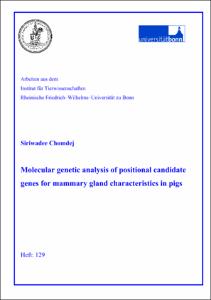Chomdej, Siriwadee: Molecular genetic analysis of positional candidate genes for mammary gland characteristics in pigs. - Bonn, 2005. - Dissertation, Rheinische Friedrich-Wilhelms-Universität Bonn.
Online-Ausgabe in bonndoc: https://nbn-resolving.org/urn:nbn:de:hbz:5N-05614
Online-Ausgabe in bonndoc: https://nbn-resolving.org/urn:nbn:de:hbz:5N-05614
@phdthesis{handle:20.500.11811/2189,
urn: https://nbn-resolving.org/urn:nbn:de:hbz:5N-05614,
author = {{Siriwadee Chomdej}},
title = {Molecular genetic analysis of positional candidate genes for mammary gland characteristics in pigs},
school = {Rheinische Friedrich-Wilhelms-Universität Bonn},
year = 2005,
volume = 129,
note = {Inverted teat reduce the number of functional mammary complexes in affected sows leading for reduction of piglet productivity and litter growth during the lactation period. This detect occures in commercial pig breeds with frequencies between 8 to 30%. Due to selection of affected animals economic consequences in the breeding programm are considerate.
The study aims to identify single nucleotide polymorphism (SNPs) in the positional candidate genes for the inverted teat defect in porcine, and to determine the linkage and physical location of TGFB1, RLN and PTHLH gene. Moreover the association of TGFB1, RLN and PTHLH gene on inverted teat trait were evaluated. The transforming growth factor beta 1 gene (TGFB1) and relaxin gene (RLN) were proposed to be tested for association in a positional candidate gene approach which combines linkage information for inverted teat defect and mapping information of a candidate gene. Both genes mapped in QTL regions for inverted teats discovered in the Bonn-Berlin resource family and involved in proliferation and differentiation processes of mammary gland. The family-based association test (FBAT) was used for allelic association between inverted teat defect and genotype. Highly significant evidence for association of RLN and the inverted teat defect affection in the Bonn-Berlin DUMI resource population was found. No significant effects of TGFB1 on affection status were detected. In addition, parathyroid hormone like hormone gene (PTHLH) was proposed as a functional candidate gene that regulates epithelial mesenchymal interactions during the formation of mammary gland. It could also been shown to be highly significantly associated with affection status. Highly significant association was also found between TGFB1, RLN and PTHLH loci and number of teats and number of inverted teats. Further confirmation of these results in independent samples of other populations will be conducted.},
url = {https://hdl.handle.net/20.500.11811/2189}
}
urn: https://nbn-resolving.org/urn:nbn:de:hbz:5N-05614,
author = {{Siriwadee Chomdej}},
title = {Molecular genetic analysis of positional candidate genes for mammary gland characteristics in pigs},
school = {Rheinische Friedrich-Wilhelms-Universität Bonn},
year = 2005,
volume = 129,
note = {Inverted teat reduce the number of functional mammary complexes in affected sows leading for reduction of piglet productivity and litter growth during the lactation period. This detect occures in commercial pig breeds with frequencies between 8 to 30%. Due to selection of affected animals economic consequences in the breeding programm are considerate.
The study aims to identify single nucleotide polymorphism (SNPs) in the positional candidate genes for the inverted teat defect in porcine, and to determine the linkage and physical location of TGFB1, RLN and PTHLH gene. Moreover the association of TGFB1, RLN and PTHLH gene on inverted teat trait were evaluated. The transforming growth factor beta 1 gene (TGFB1) and relaxin gene (RLN) were proposed to be tested for association in a positional candidate gene approach which combines linkage information for inverted teat defect and mapping information of a candidate gene. Both genes mapped in QTL regions for inverted teats discovered in the Bonn-Berlin resource family and involved in proliferation and differentiation processes of mammary gland. The family-based association test (FBAT) was used for allelic association between inverted teat defect and genotype. Highly significant evidence for association of RLN and the inverted teat defect affection in the Bonn-Berlin DUMI resource population was found. No significant effects of TGFB1 on affection status were detected. In addition, parathyroid hormone like hormone gene (PTHLH) was proposed as a functional candidate gene that regulates epithelial mesenchymal interactions during the formation of mammary gland. It could also been shown to be highly significantly associated with affection status. Highly significant association was also found between TGFB1, RLN and PTHLH loci and number of teats and number of inverted teats. Further confirmation of these results in independent samples of other populations will be conducted.},
url = {https://hdl.handle.net/20.500.11811/2189}
}






